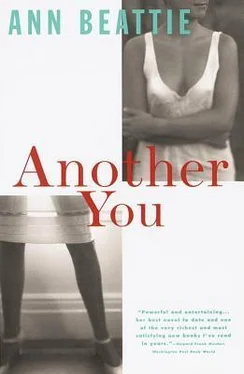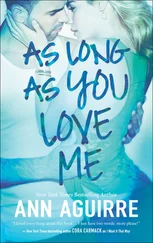Ann Beattie - Another You
Здесь есть возможность читать онлайн «Ann Beattie - Another You» весь текст электронной книги совершенно бесплатно (целиком полную версию без сокращений). В некоторых случаях можно слушать аудио, скачать через торрент в формате fb2 и присутствует краткое содержание. Год выпуска: 2014, Издательство: Vintage Books, Жанр: Современная проза, на английском языке. Описание произведения, (предисловие) а так же отзывы посетителей доступны на портале библиотеки ЛибКат.
- Название:Another You
- Автор:
- Издательство:Vintage Books
- Жанр:
- Год:2014
- ISBN:нет данных
- Рейтинг книги:5 / 5. Голосов: 1
-
Избранное:Добавить в избранное
- Отзывы:
-
Ваша оценка:
- 100
- 1
- 2
- 3
- 4
- 5
Another You: краткое содержание, описание и аннотация
Предлагаем к чтению аннотацию, описание, краткое содержание или предисловие (зависит от того, что написал сам автор книги «Another You»). Если вы не нашли необходимую информацию о книге — напишите в комментариях, мы постараемся отыскать её.
Another You — читать онлайн бесплатно полную книгу (весь текст) целиком
Ниже представлен текст книги, разбитый по страницам. Система сохранения места последней прочитанной страницы, позволяет с удобством читать онлайн бесплатно книгу «Another You», без необходимости каждый раз заново искать на чём Вы остановились. Поставьте закладку, и сможете в любой момент перейти на страницу, на которой закончили чтение.
Интервал:
Закладка:
Marshall was born in 1944. Alice said to me — prefacing it by saying that although she was about to overstep her bounds, she still had to tell me what she was thinking — that she hoped it was not lost on me, the fact that quite soon after Gordon’s birth, Miles had gotten me pregnant with Martin, and now, so soon after Martin’s death, she had given birth to Marshall. Next he would want me to have another child, and then he would turn to her again. It was the beginning of her becoming unbalanced. I remember also, that she read, that summer, a book by Wilkie Collins called The Woman In White , and that she imagined that her finding it on a bookshelf was no coincidence, and she became profoundly depressed at the actions of the dastardly Sir Percival Glyde. Miles gave away the book, and also The Moonstone , by the same author. He even got rid of books by Charles Dickens — as if that would protect us from any further misery! I think he did not get her help as soon as he might have because she had also had mood swings after the birth of Gordon — that, and naturally he did not want to think about the serious implications of her behavior. I can remember him telling me, quite sincerely, it seemed, that paranoia was in the air, and he later reminded me that he had seen this trend long before others did. When later the nation got caught up in the Communist scare, he saw Nixon’s persecution of Hiss for what it was, deplored the irrational witch-hunt, became angry at a zoologist he had known years before for publishing a book called Our Plundered Planet , about the alleged dangers of DDT. He thought there was much unfounded paranoia in America, the paranoia of certain fame seekers who knew how to capture the media’s attention, so that their mass paranoia had seeped into sane minds, polluting them.
Actually, he was the one who never recovered. She and I adapted, had our highs and lows, but he became entrenched in his ideas. Americans became worse than fools for believing stories about microfilm hidden in pumpkins — why, next they would believe that the stork would be scared off from delivering babies by people prowling through pumpkin patches. In 1941, when I first went to Maine, he was already raving about Thomas Hart Benton’s having said he hated museums, which Miles saw as a subversive plot to keep people away from culture. He later became furious at the appearance of Abstract Expressionism, saying that now there was a Communist plot, if people had to have their Communist plots: Pollock was only a madman, according to him; his so-called action painting a farce he meant to put over on credulous critics, while pandering to the lowest common denominator of Americans’ credibility by dripping paint on enormous canvasses and claiming that what Miles called “skunk sprayings” were works of art, important personal statements controlled by unconscious forces.
For a while, though, things went along. Marshall was born, and he was a joy to us. Things went along until Alice became too incapacitated to really function, and then he did what men think to do: he took her on a trip to New York, and when he sensed that hadn’t done the trick, he hedged his bets by contacting the doctor she and I had seen, briefly, after Martin’s death, yet he also kept her in New York, far enough away that the doctor could not do her any good, which to him meant any harm, and where I also could not exert any influence. I could shame her into stopping drinking, and he knew it. But he enjoyed it himself. Didn’t want to be told it was harmful. He thought he could re-create the past simply by cutting her off from the present, but she was too smart for that. Still, she must have felt very vulnerable, very uncertain about her own capabilities, if she let him convince her for so long that she should be apart from her children. It wasn’t until she was actually hospitalized that any of my letters to her got through. She wrote back and said she’d heard nothing while they lived for that long time in the hotel. Who would prosper, when they were upset, by living out of a suitcase, being dragged to business dinners, kept away from their children and from everything that provided them with stability? It was wartime. The entire nation was upset to begin with. He had always been so overbearing, but through time he also became smooth. As he aged, people began to think him a charming, if slightly out-of-touch, gentleman of the old school, which of course implied he was an upstanding fellow. It was no different from the way he had first appeared to me, clasping my hand meaningfully and then kissing me discreetly on the cheek, so as not to frighten me. He seduced me sexually, and he proceeded to seduce anyone else he wanted, in any area in which he wanted to seduce them, whether it be for business or for pleasure. Amelia, for example, was a gratuitous seduction. Did he think I’d be flattered he wanted me so much more? Did he think he’d take her to bed and buy her silence? Amelia and I sat together in Dr. St. Vance’s office, during that long time he kept himself and Alice exiled from Maine, and I heard what she had to say. I had guessed there was something between them, just as Alice intuited he still slept with me from time to time, of course. What he hadn’t counted on was how much Alice meant to him. How much his own wife meant. Because when she faltered, when Amelia couldn’t reason with her, when my obvious devotion couldn’t quell her anxiety, he started to realize he had quite a problem on his hands, and that it was a problem none of us would be likely to want to help with: his further subjugation of his wife. She was the one he was reluctant to let go of: not his little children; not his secret affairs on the side. That she had become capable of doing the things he did almost killed him. A woman, having an affair! Drinking! For a long time, he refused to see it. I think he thought that if he could make their world anonymous enough, she would change her behavior, cling to him. So he set up housekeeping in the Waldorf Hotel, exiled both of them from their familiar world that he realized, too late, had caused her such pain, and tried to pretend a different context would allow them to begin a different life. I think he wanted us to vanish: for the boys to disappear; for me to return to Montreal. I did go there, briefly, though I understood he did not really approve of my leaving. My father had had surgery, and my mother seemed disproportionately upset. How strange that the sight of me was not so much soothing in its own right, but that he was reassured I was prospering. That was what he saw, in spite of the fact that my hair had grown long and straggly, I had lost weight, I was at wit’s end, really. Yet when my father looked at me he saw only the prosperous child he had sent to New England. He wanted to see the pictures of the children I carried in my wallet. He showed me their Christmas card, as if Miles’s signature, alone, ensured that all was well. My mother would hardly meet my eyes: she offered me her prettiest dresses, in spite of my description of rural Maine; when I hinted that Miles and Alice had been gone much too long, she equivocated, suggesting that she and I could not understand the complexities of business. I stayed three days. I felt too guilty about leaving Amelia, who knew nothing about children, alone to care for Gordon and Marshall. I think I also feared she might stay. Her staying would validate the desperate circumstances, I felt. On the plane, I actually thought about accepting Ethan Bedell’s proposal of marriage — not because of any feelings toward him, but because … God — there was a time when I cared deeply what people thought. I had internalized my guilt so much that I wanted no one to have anything objective to latch onto with which to criticize any of us: Wouldn’t they be astonished by two women raising children, as opposed to a woman and a man? Now I read about lesbian communities, festivals celebrating modern-day witches, single parents, businesses owned exclusively by women. Then, I would have felt like Hester Prynne. I would have felt entirely conspicuous, and certain that people’s eyes would have followed me wherever I went. Curious, when I think back on it: that I would have gone to a party at the Cocoanut Grove, where everyone would have known I was not merely an au pair, yet nothing would have convinced me I could live alone, or with the help of another woman, in raising Miles and Alice’s children. The simple difference, in my mind, was that if Miles was there at my side, whatever he said would get us through, but anything I did alone, or with Amelia, would be a transparent masquerade that would inevitably disgrace me.
Читать дальшеИнтервал:
Закладка:
Похожие книги на «Another You»
Представляем Вашему вниманию похожие книги на «Another You» списком для выбора. Мы отобрали схожую по названию и смыслу литературу в надежде предоставить читателям больше вариантов отыскать новые, интересные, ещё непрочитанные произведения.
Обсуждение, отзывы о книге «Another You» и просто собственные мнения читателей. Оставьте ваши комментарии, напишите, что Вы думаете о произведении, его смысле или главных героях. Укажите что конкретно понравилось, а что нет, и почему Вы так считаете.












